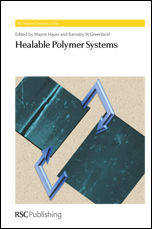Healable Polymer Systems

Editors: Wayne Hayes and Barnaby W Greenland
Polymers are used in many everyday technologies and their degradationdue to environmental exposure has lead to great interest in materials which can heal and repair themselves. In order to design new self healing polymers it's important to understand the fundamental healing mechanisms behind the material. Healable Polymer Systems will outline the key concepts and mechanisms underpinning the design and processing of healable polymers, and indicate potential directions for progress in the future development and applications of these fascinating and potentially valuable materials.
The book covers the different techniques developed successfully to date for both autonomous healable materials (those which do not require an external stimulus to promote healing) and rehealable or remendable materials (those which only recover their original physical properties if a specific stimulus is applied). These include the encapsulated-monomer approach, reversible covalent bond formation, irreversible covalent bond formation and supramolecular self-assembly providing detailed insights into their chemistry.
Written by leading experts, the book provides polymer scientists with a compact and readily accessible source of reference for healable polymer systems.
Brief Contents
- Healable Polymers - General Principles
- Encapsulated-monomer approaches to Healable Polymers and their Composites
- Reversible covalent bond formation as a strategy for Healable Polymers
- Irreversible Covalent Bond Formation
- Supramolecular Healable Polymers
Series: RSC Polymer Chemistry Series
Publisher: Royal Society of Chemistry
ISBN: 9781849736268
Price: £99.99
Publication date: 22/03/2013
Target audience: Professional and Scholarly
Format: Hardback
Size: 234mm x 156mm
Pages: 224
Illustrations: Black & White
BIC: PNNP, TGM, PN
Click here for more information.
Terms
While we only use edited and approved content for Azthena
answers, it may on occasions provide incorrect responses.
Please confirm any data provided with the related suppliers or
authors. We do not provide medical advice, if you search for
medical information you must always consult a medical
professional before acting on any information provided.
Your questions, but not your email details will be shared with
OpenAI and retained for 30 days in accordance with their
privacy principles.
Please do not ask questions that use sensitive or confidential
information.
Read the full Terms & Conditions.